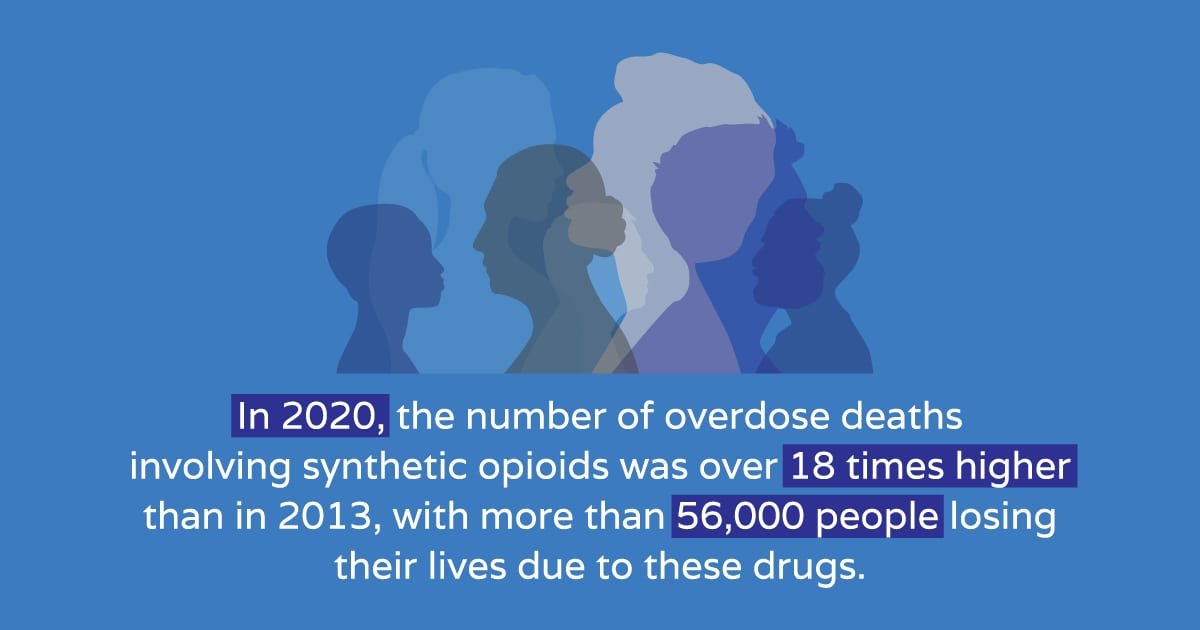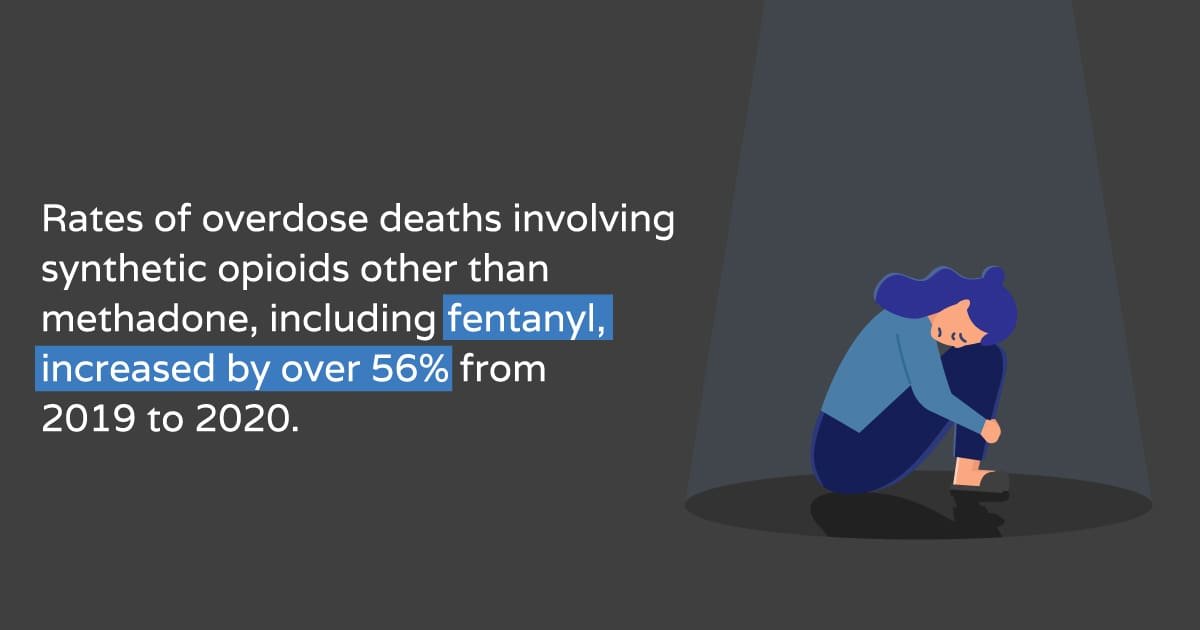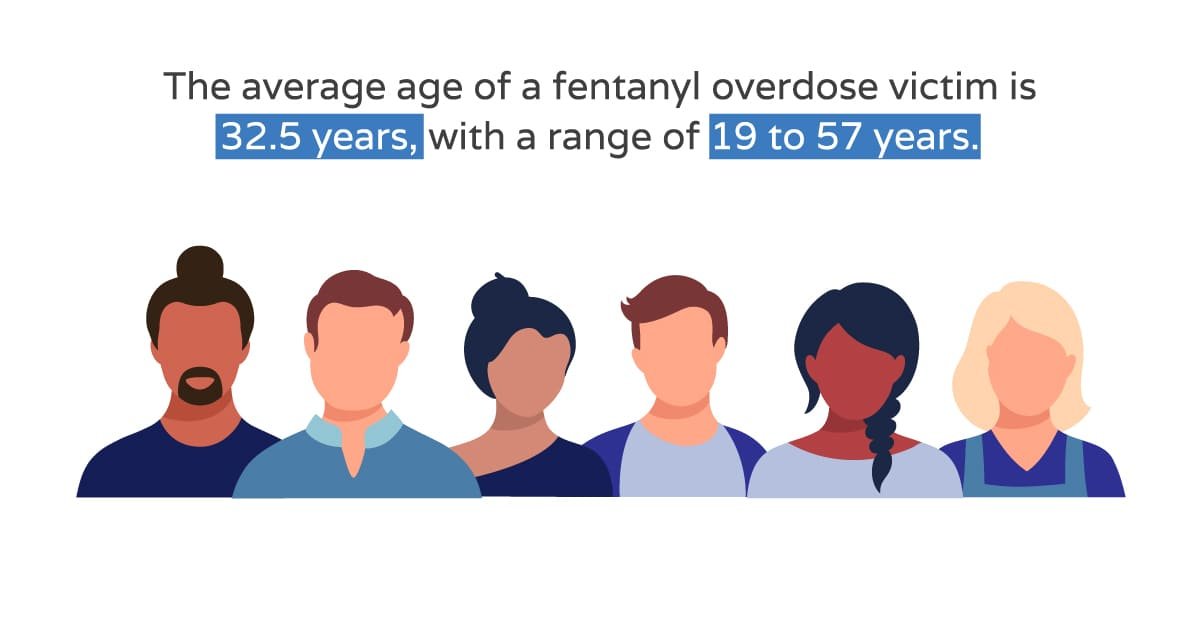Home | Fentanyl Addiction
Understanding the Risks and Symptoms of Fentanyl Addiction and Treatment Options
Fentanyl addiction involves dependence on a potent synthetic opioid, similar to morphine but much stronger. This addiction often leads to increased tolerance, withdrawal symptoms upon cessation, and a high risk of overdose due to fentanyl’s potency, necessitating intensive treatment for recovery.
Fentanyl is a powerful opioid pain medication that is highly addictive and often misused. Over the past few years, there has been a surge in fentanyl addiction cases in the United States, with devastating consequences.
In this article, we will explore what fentanyl is, its medical and recreational uses, its side effects and dangers, and treatment options to overcome addiction.
Jump to Section
What is Fentanyl?
Fentanyl is a powerful synthetic opioid medication that is primarily used to manage severe pain, particularly in cases of chronic pain or pain related to cancer. It is a prescription medication that is 50 times more potent than heroin and 100 times more potent than morphine. Fentanyl works by binding to opioid receptors in the brain and spinal cord, thereby reducing the sensation of pain.
Fentanyl Use Cases
Fentanyl is available in a variety of forms, including patches, tablets, lozenges, injections, and nasal sprays. It is typically reserved for patients who have not responded to other pain medications or for those who require pain management after surgery or other medical procedures.
Fentanyl is a controlled substance due to its high potential for abuse and addiction. It can be dangerous if used improperly or taken in excessive amounts, as it can cause severe respiratory depression and even death. Therefore, it is important to only use fentanyl as directed by a healthcare professional and to never share it with others.
Uses of Fentanyl
Fentanyl is used in a variety of different ways, both medically and recreationally. These use cases will be detailed below.
Medical Uses of Fentanyl
Fentanyl is FDA-approved to treat severe pain. Below are the medical uses for which fentanyl is administered or prescribed.
- Pain Management: Fentanyl is primarily used for the management of severe pain, particularly chronic pain or pain related to cancer. It is used to treat pain that cannot be controlled with other medications.
- Anesthesia: Fentanyl is also used as an adjunct to general anesthesia for surgical procedures. It is used to reduce the amount of anesthesia needed and to help with post-operative pain management.
- Palliative Care: Fentanyl is often used in palliative care to help manage pain in patients with terminal illnesses.
- Emergency Medicine: Fentanyl can be administered in emergencies for the treatment of severe pain or as an adjunct to anesthesia.
Recreational Uses of Fentanyl
Fentanyl is often used illicitly as a recreational drug due to its potent opioid effects. It is often added to other drugs, such as heroin or cocaine, to increase their potency. In some cases, people unknowingly consume fentanyl when drug dealers mix it with other substances, as a very little amount of fentanyl is enough to give that high effect making it a cheaper option.
But this increases the risk of overdose. This is because fentanyl is much more potent than other opioids and can cause respiratory depression and other serious side effects even in small doses.
Request a Confidential Call
Take the First Step Toward Recovery.
If you or someone you know is struggling with addiction, we encourage you to request a confidential call. At Rockland Treatment Center, we understand the sensitivity and complexity of your situation and are here to offer you a space to explore treatment options, ask questions, and receive support from experienced professionals. Taking this first step can be challenging, but it’s a courageous and significant move towards a healthier, more fulfilling life.
"*" indicates required fields
Prevalence of Fentanyl Use
In 2020, the number of overdose deaths involving synthetic opioids was over 18 times higher than in 2013, with more than 56,000 people losing their lives due to these drugs.
Additionally, rates of overdose deaths involving synthetic opioids other than methadone, including fentanyl, increased by over 56% from 2019 to 2020. These alarming statistics suggest an acceleration of overdose deaths during the COVID-19 pandemic, highlighting the urgent need for prevention, education, and treatment programs to address the fentanyl epidemic.

Why is Fentanyl Addiction on the Rise?
There are several reasons why fentanyl addiction has become more common in recent years. One major factor is the increasing availability of fentanyl on the black market, where it is often mixed with other drugs such as heroin, cocaine, or counterfeit prescription pills. This has led to many people unknowingly consuming fentanyl, which increases the risk of overdose and addiction.
Another reason for the rise in fentanyl addiction is its high potency. Fentanyl is much more potent than other opioids, which means that it can be addictive even in small doses. Additionally, people who have built up a tolerance to other opioids may turn to fentanyl to achieve the same level of euphoria, which can lead to fentanyl addiction.
Demographics of Fentanyl Addiction
Fentanyl addiction affects individuals of all ages, genders, socioeconomic status, and ethnicities, but certain demographic trends have been observed. The majority of fentanyl overdose victims are male, accounting for 78% of cases, while females make up 22%. The average age of a fentanyl overdose victim is 32.5 years, with a range of 19 to 57 years.
In terms of ethnicity, Caucasians account for the largest percentage of fentanyl overdose victims at 50%, followed by Hispanics at 29%, Black individuals at 20%, and Asians at 0.9%. These demographics highlight the need for targeted prevention and treatment efforts that take into account the unique needs and characteristics of different populations affected by fentanyl addiction.
Risk Factors for Fentanyl Addiction
Several risk factors may contribute to the development of fentanyl addiction. These include:
- History of Substance Abuse: Individuals who have a history of substance abuse, particularly with opioids, are at increased risk of developing a fentanyl addiction.
- Mental Health Disorders: Individuals with mental health disorders, such as depression, anxiety, or post-traumatic stress disorder (PTSD), may be more susceptible to developing an addiction to fentanyl.
- Social Factors: Individuals who live in areas with high rates of opioid use or who have friends or family members who use opioids may be more likely to develop a fentanyl addiction.
- Genetics: Some individuals may be more genetically predisposed to developing an addiction to opioids, including fentanyl.
We accept most insurance plans
Fentanyl Addiction: How Dangerous is it?
Fentanyl is an extremely potent synthetic opioid that can be highly dangerous when used improperly. Here are some of the risks and effects associated with fentanyl use:
Risks Associated with Fentanyl Use
Fentanyl use and fentanyl addiction can lead to:
- Respiratory depression and potential for fatal overdose
- Addiction and dependence
- Withdrawal symptoms
- Nausea and vomiting
- Dizziness and confusion
- Slowed heart rate and blood pressure
- Muscle stiffness and tremors
- Increased risk of falls and accidents
- Compromised immune function
Short-term and Long-term effects of Fentanyl Use
Fentanyl use and addiction can also lead to:
- Short-term effects: Extreme euphoria, sedation, pain relief, relaxation, and slowed breathing.
- Long-term effects: Chronic pain, depression, anxiety, irritability, social isolation, insomnia, financial difficulties, and legal problems.
Fentanyl: Emergency Threat
Signs of Fentanyl Addiction
- Increased Tolerance: Individuals with a fentanyl addiction will require higher and more frequent doses of the drug to achieve the same effect, as their bodies become accustomed to its effects.
- Withdrawal Symptoms: When someone is addicted to fentanyl, they may experience physical and psychological symptoms of withdrawal when they attempt to quit or reduce their use. These symptoms may include nausea, vomiting, diarrhea, muscle aches, insomnia, anxiety, and depression.
- Obsessive Thoughts: People who are addicted to fentanyl may spend a lot of time thinking about using the drug, and may go to great lengths to obtain it, even if it means sacrificing other areas of their life.
- Changes in Mood or Behavior: Fentanyl addiction can cause significant changes in mood or behavior, including irritability, depression, anxiety, agitation, and social isolation.
- Financial Problems: Fentanyl addiction can be expensive, and individuals may start to struggle to afford the drug or other necessities as a result.
- Neglect of Responsibilities: Individuals with a fentanyl addiction may begin to neglect their responsibilities at work, school, or home as a result of their drug use.
- Physical Changes: Prolonged fentanyl use can lead to physical changes in appearance and behavior, such as weight loss, poor hygiene, and deteriorating physical health.
Get fast answers to your questions
Fentanyl Overdose
Below are the signs of overdose; knowing them can save lives:
- Symptoms of a fentanyl overdose may include shallow or slowed breathing, pinpoint pupils, extreme sedation, cold and clammy skin, blue lips and nails, and loss of consciousness.
- An overdose can quickly lead to respiratory failure and death, making it essential to seek medical help immediately if an overdose is suspected.
- The risk of overdose is especially high when fentanyl is used in combination with other substances, such as alcohol or benzodiazepines.

What to do When Someone Overdoses
If you suspect that someone is experiencing a fentanyl overdose, it is crucial to act quickly and seek emergency medical assistance. Here are some steps to take:
- Call 911: Dial emergency services immediately and explain the situation. Be prepared to provide as much information as possible, including the individual’s age, weight, and any medications or substances they have ingested.
- Administer Naloxone: If you have access to naloxone (also known as Narcan), a medication that can reverse the effects of an opioid overdose, administer it as directed. Naloxone is available as a nasal spray or injection, and it can help to restore breathing and prevent death in the event of an overdose.
- Monitor Breathing: If the individual is unconscious or experiencing shallow breathing, place them in the recovery position to help maintain an open airway. Monitor their breathing and pulse until emergency services arrive.
- Provide Support: Remain calm and reassure the individual, letting them know that help is on the way. If they are conscious, keep them talking and engaged to help prevent them from losing consciousness.
- Cooperate with Emergency Services: When emergency services arrive, provide them with any relevant information and follow their instructions. Be prepared to provide additional support to the individual as needed.
Remember, fentanyl overdose can be life-threatening, and it is essential to act quickly and seek medical assistance as soon as possible. Naloxone can be a life-saving medication in these situations, but it is not a substitute for emergency medical care.
The Addictive Nature of Fentanyl
Fentanyl is a highly addictive synthetic opioid that works by binding to the brain’s opioid receptors, producing a rapid and intense sense of euphoria and pain relief. Due to its potency, even small amounts of fentanyl can lead to addiction, dependence, and overdose. Fentanyl addiction can occur both in individuals who use the drug recreationally and those who take it for legitimate medical reasons.

Fentanyl Addiction Development
Fentanyl addiction can develop rapidly, often after just a few uses. Initially, individuals may feel a sense of pleasure, relaxation, and pain relief when taking the drug. However, as they continue to use fentanyl, their bodies may develop a tolerance, meaning they need increasingly larger doses of the drug to achieve the same effects.
This cycle can lead to physical and psychological dependence, making it difficult for individuals to stop using the drug even when they want to.
The Cycle of Addiction
The cycle of fentanyl addiction is complex and often difficult to break. The cycle typically involves the following stages:
- Initial use: The individual takes fentanyl for the first time, often seeking the euphoric and pain-relieving effects.
- Tolerance development: With continued use, the individual’s body becomes tolerant to the drug, requiring higher doses to achieve the same effects.
- Physical dependence: The individual’s body becomes dependent on fentanyl, and they experience withdrawal symptoms if they try to stop using the drug.
- Psychological dependence: The individual develops a psychological craving for fentanyl, often experiencing intense cravings and thoughts about using the drug.
- Addiction: The individual becomes addicted to fentanyl, unable to stop using the drug even when it causes negative consequences in their life.
Treatment Options for Fentanyl Addiction
Fentanyl addiction is a serious and complex condition that requires a comprehensive and individualized treatment approach. The goal of fentanyl addiction treatment is to help individuals overcome their physical and psychological dependence on the drug, manage withdrawal symptoms, and prevent relapse.
There are several treatment options available for fentanyl addiction, including:
Medication-Assisted Treatment (MAT)
MAT combines behavioral therapy with medication to help individuals manage withdrawal symptoms and cravings. Common medications used for fentanyl addiction treatment include methadone, buprenorphine, and naltrexone.
A Deeper Look at MAT
Inpatient or Residential Treatment
Inpatient or residential treatment programs provide a structured environment where individuals receive intensive therapy and medical support. These programs can last for several weeks or months and are ideal for individuals with severe fentanyl addiction or co-occurring mental health disorders.
Outpatient Treatment
Outpatient treatment programs offer flexible scheduling and can be an effective option for individuals with milder addiction or who cannot take time off work or school. These programs typically involve individual and group therapy, medication management, and support groups.
Cognitive-Behavioral Therapy (CBT)
CBT is a type of therapy that helps individuals identify and change negative thought patterns and behaviors that contribute to addiction. CBT can be delivered in individual or group settings and is often combined with other therapies.
A Deeper Look at CBT
Support Groups
Support groups provide individuals with a community of peers who understand the challenges of addiction and can provide emotional support and encouragement during recovery.

Contact Rockland Recovery Treatment Centers
GET THE SUPPORT YOU NEED
Rockland Recovery is a leader in addiction treatment and mental health care. Our multidisciplinary team of top medical experts is committed to addressing the unique needs of each patient. Reach out to us anytime – we are available 24/7.
For additional information or to find addiction treatment and mental health services in your area, contact us directly or visit SAMSHA’s treatment locator. For immediate assistance, call or text 988 to reach the National Suicide & Crisis Lifeline or 855.732.4842 to speak to a Care Coordinator at Rockland Recovery.

Medically Reviewed by Kate Perfetti, LADC II
Search
Addiction Treatment Programs
Request a confidential call
"*" indicates required fields
Addiction Treatment Programs Massachusetts
Our comprehensive substance abuse treatment services are designed not just to treat the symptoms of addiction but to address the underlying causes, fostering deep, lasting healing and personal growth.





